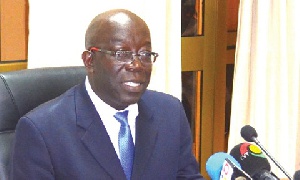 Director-General of SSNIT, Dr John Ofori-Tenkorang
Director-General of SSNIT, Dr John Ofori-Tenkorang
The Social Security and National Insurance Trust (SSNIT) says it is confident measures being taken to secure the sustainability of the scheme will yield the desired results.
The Trust maintained that rigorous managerial auditing had revealed that in the wake of current global technological advancement and changing phases of pension schemes, good quality human resource was critical to the survival of any pension scheme.
Director-General of SSNIT, Dr John Ofori-Tenkorang said “we have instituted procedures such as performance management, succession planning, the right technology for our operations among others to ensure that we retain our staff.”
Dr Ofori-Tenkorang who was addressing a media encounter at Aburi in the Eastern region said management will continue to strengthen performance-based reward system that will ensure that hard work is encouraged and rewarded.
The SSNIT Director-General assured stakeholders that, the new team was implementing decisive strategies to improve customer service, brand and reputation management, which culminated in the Trust being ranked first in the Public Sector category for Customer Service in the 2018 Ghana Customer Service Index Report released by the Institute of Customer Service Professionals.
He said the Board and Management also initiated periodic engagements with staff, which took place during unannounced visits to various Branches and Departments.
Dr Ofori-Tenkorang revealed that to ensure that staff operated professionally, new mechanisms for monitoring staff performance including; mystery shopping, which contributed to customer service officers and other front-line personnel now engaged and treated the public with sensitivity and politeness.
He said management has also introduced the Pensioners Priority Desk to ensure that pensioners who walked into their offices did not queue before being attended to.
“Members of the scheme can now check their statements online and transact business with the Trust through our portal. Through this same portal, employers can now submit their Contributions Reports for validation and make payments at the nearest bank without having to visit any SSNIT Office,” Dr Ofori-Tenkorang noted.
On the way forward, the SSNIT Director-General said over the next two years, “we shall complete the restructuring of our customer service delivery to reduce unnecessary stakeholder exposure to staff with clearly marked out roles to be performed by frontline staff who are properly trained to interact with customers”.
Dr Ofori-Tenkorang noted that by the end of 2019 SSNIT would undertake a number of key initiatives; including; integration through the National Identification Authority (NIA) and payments through MoMo, SSNIT App, Ghana Registration A, Registrar General’s Department integration.
“We are working to change the perception of workers, make sure our stakeholders understand the business and operations of the Trust, the value the scheme provides and thereby pay their contributions voluntarily.
Action on ‘ghost’ names saves over GH?40million
The Trust had successfully deleted over 6,000 ‘ghosts’ from the pensioners’ database, as at April 10, 2019, saving some 40,761,729.26.
The amount, SSNIT indicated had been withheld from going into wrong hands.
“For the period under review, 6,328 names were deleted from the pensioners list, while 2,038 names were restored on the pensioners’ payroll,” Deputy Director General (DDG) for the Trust, Ms Laurette Korkor Otchere disclosed.
Processing time for payment benefits drops
Pensions’ payments processing time, including those for invalidity dropped from an average of 27 days in 2017 to 21 days in 2018.
The reduction in processing time, according to SSNIT was below the target of 30 days, noting that “the duration in 2016 was 47 days.”
Processing time for payment of old age lump sum also dropped from an average of 14 days in 2017 to 11 days in 2018, a development SSNIT described as a major achievement from the target of 30 days.
For Survivors’ lump sum, processing time for payments dropped from an average of 15 days in 2017 to 9 days in 2018. The figure for 2016 was 25 days.